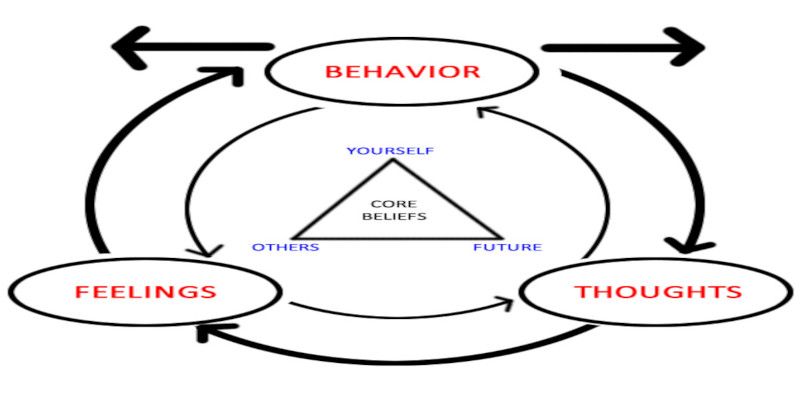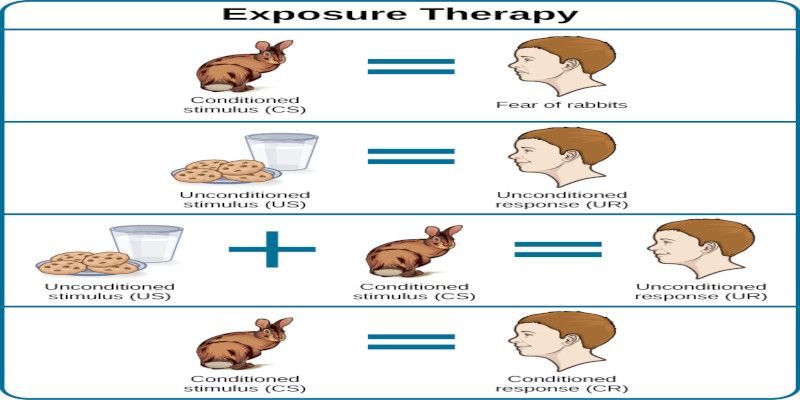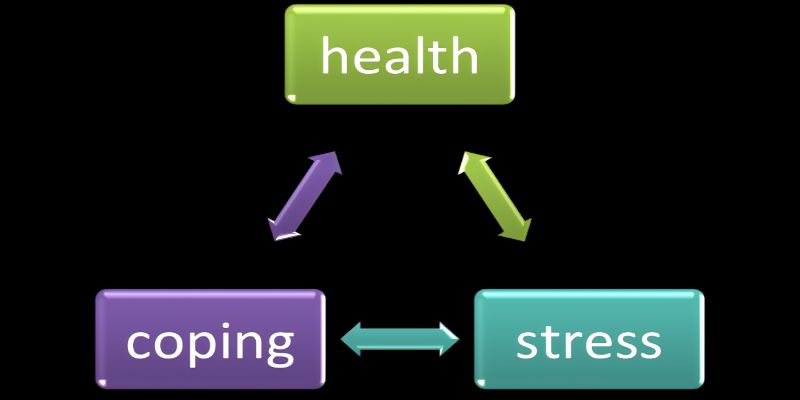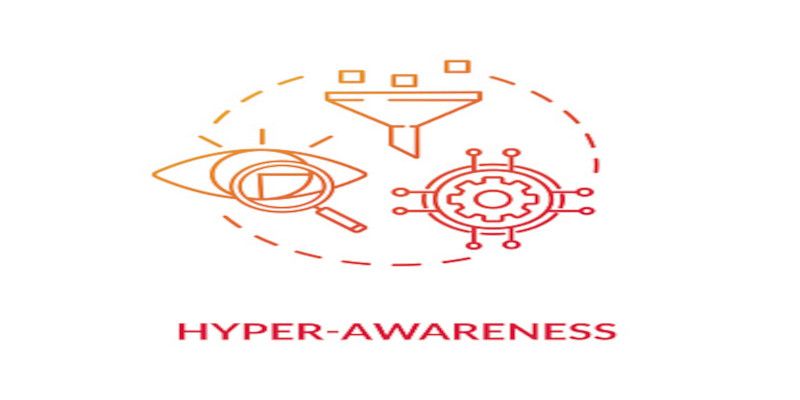Table of Contents
ToggleHyperawareness can be both an advantage and a liability.
For example, someone can be hypervigilant of their social surroundings, allowing them to read the different social interactions and social relationships better than other people can.
However, hyper-self-awareness might subject that person to an increased amount of negative thoughts, and emotions, and as a result, create certain mental disorders such as depression and anxiety.
Advantages of hyper awareness

Allows you to read situations better
Being hyper-aware means you’re focusing more intensely on your surroundings, which leads to absorbing more information.
It can even be considered normal to be hyperaware when faced with perpetual extremely dangerous situations since it can potentially be a survival and defense mechanism. Think of being placed in a dangerous line of work such as being a soldier who’s at the front of a war.
This increased amount of information you take in lets you dissect situations better, thus allowing you to get a clear understanding of whatever situation you’re in.
Better eye for details
If you’re specifically looking to understand your surroundings, then chances are you’re going to be better at recognizing details that most people brush off as being unimportant or meaningless.
Like they say, the devil is in the details. And you should learn to read between the lines to figure out how things truly are in reality.
Allows you to analyze better

This one might seem obvious. If you are aware of your surroundings to a fault, chances are you’re going to be better at analyzing those surroundings because you’re specific.
That’s why looking for certain clues in your environment will aid you in understanding your surroundings better.
This can lead to more efficient learning
The more information you’re able to take in, the larger the capacity to learn something new. And possibly, though not always, at a faster rate.
However, it’s not a given that just because you’re very aware of your surroundings, you’re automatically good at learning new things.
Can help you to predict the future
One of the benefits of hyperawareness is that it can help you anticipate events that will happen in the future.
Predicting the future should not be taken literally, but rather that you can expect what things are likely to occur somewhere down the road.
Analyzing something thoroughly can help you to understand the situation, how the state of affairs has evolved thus far, and how life works in general.
All those things can assist you in making an educated “guess” of how the future will pan out.
This can lead to undertaking more action

Because you are hyper-self-aware, you have analyzed and thus seen where some of your bad decisions will lead to in life if you were to act upon them.
This might cause one to become aware of the fact that some of those explored roads are not worth wandering. Either because we’ve walked that path before in our minds, or physically.
This might light a fire under you that makes you undertake action to take a different route toward your passions and whatever you want out of life.
Disadvantages of hyper awareness

This can lead to increased levels of anxiety and fear
Since hyper-aware folks can recognize all the things that can potentially go wrong and what might be dangerous, they can develop many mental disorders.
Think of mental illnesses such as hyper-awareness anxiety, social anxiety, obsessive-compulsive disorder (OCD), or worse, becoming straight-up fearful of social interactions.
This hyper-awareness anxiety, fear, or general anxiety can interfere with your daily living and your overall quality of life.
It’s important to note that even though you might understand that a lot of things can potentially go wrong, you should still put yourself out there in the real world. You can still take calculated risks and practice your social interactions with other people.
Living more in your head than in the real, physical world

One of the biggest downsides of being hyperaware is that observing your surroundings intensely inherently means you’re stuck inside your own head much more than those who analyze less intensely.
You need to be in your mind when trying to figure out what the big picture is, which details are significant, and when you’re trying to make sense of the world.
But being too self-aware means it can become a habit to start living in your imagination rather than taking the moment. In the real world.
Of course, the physical world can’t be dismissed as unimportant, even if you like living in your brain. So try to take some time to enjoy the moment instead of analyzing things to a fault.
Can make social interaction more difficult

Successful communication is accomplished by focusing your attention outwards, not inwards.
Because hyper-self-conscious people are so internally focused, it can be harder for them to concentrate their attention outwards to communicate with other people effectively.
My best advice for people suffering from social anxiety and for hyper-self-conscious individuals is to center your attention externally toward your conversational partner.
Make eye contact, ask questions, listen to their response and what their body language is trying to tell you. Simply put, respond to what they’re telling you verbally and nonverbally. You should react to all this newly acquired information by your senses.
It will force you to concentrate on your conversational partner instead of thinking too much.
Can prevent you from taking action
Because you recognize what can go wrong, and the potential dangers that lurk in life, you might become fearful to undertake action.
However, despite knowing what can potentially go wrong, it’s still important to be brave and take chances. Because doing nothing is a big decision in itself, and rarely an advantageous one.
Good things rarely come from doing nothing. This makes simply waiting for success and happiness to come to you not a viable strategy.
This can lead to development mental disorders

Being hyper-aware means you are busy analyzing what’s going on, and what can happen in the future most of the time.
Being inside your head so much, and perhaps not getting the proper amount of real-life social interaction can lead to developing mental disorders like obsessive-compulsive disorder (OCD), anxiety, and in extreme cases, even becoming paranoid.
Especially if you’re a pessimistic person by nature. We know that our thoughts influence our emotions. If you experience a lot of negative feelings, then it’s a lot more likely that you’ll start suffering from a mental condition sooner or later.
Frequently Asked Questions (FAQ)
What is hyper awareness?
Hyper awareness, also commonly called hypervigilance, would be defined as being extremely aware of one’s surroundings.
And while a lot of people have attention for their direct environment, hyperaware people take this to the extreme. Many types of hyperawareness exist.
What is hyper self-consciousness?

Hyper self-consciousness is also commonly called hyper self awareness. It can be defined as being in a state of heightened self awareness.
People who are too self-aware have an intense preoccupation with themselves. Either with their behavior, their thoughts, or how they’re perceived by others.
And while being alert about oneself might seem like a good thing at first, unpleasant feelings may occur where the affected person is too self-conscious feels watched as a result.
People who are overly self-conscious may develop shyness or paranoia as a consequence of feeling constantly observed.
The link between hyper self-consciousness and social anxiety

There’s a link between extreme self-consciousness and bad social anxiety.
People with social anxiety experience discomfort and other associated negative emotions like sweating, shaking, and worrying in social settings.
This may lead to people who are suffering from bad social anxiety avoiding situations where they experience those intense antagonistic emotions.
Important to note is that people who suffer from social anxiety do so because they are worried, or fear that something is going to go wrong.
People who are socially anxious can be afraid they’re going to say something “wrong” or silly. It’s also possible that they’re frightened of being judged negatively by others.
We already defined that extreme self-consciousness means you are intensely focusing on yourself, your thoughts, and your personal feelings. In turn, this will only exacerbate the feeling of being evaluated by others, which is basically what social anxiety is.
The other way around is also a possibility. It’s realistic that severe social anxiety can lead to becoming overly self-conscious. Being socially anxious can cause people to turn inwards even more. Thus, exacerbating the person’s self awareness.
Other possible hyper awareness disorders

Hyper awareness anxiety
As previously stated, hyper awareness can lead to a hyper awareness anxiety disorder.
When someone is overly conscious of their surroundings and, more importantly, of themselves, then it’s possible to become socially anxious or nervous in general as a result from a strong feeling of being evaluated by others.
Hyper awareness phobias
Hypervigilance can lead to phobias in extreme cases. Phobias are an intense, or irrational, fear about something.
People who suffer from a phobia will typically go to great lengths to avoid said thing or situation that they’re irrationally afraid of.
One particular study shows that the inhibition of hypervigilance is effective at treating simple traumatic phobias.
Hyper awareness of thoughts OCD

Being hyper aware can lead to developing an obsessive compulsive disorder (OCD). One can even become hyper aware of thoughts as a result of spending so much time inside their own head.
These certain thoughts that get repeated over and over are called obsessions. These obsessions are regularly accompanied by compulsions, which are a need to perform certain routines repeatedly to reduce the experienced tension.
Hyper aware personality/hyper self awareness disorder
Hyper self awareness personality can be defined as being self-conscious about oneself to a fault.
This means that the afflicted person is overly preoccupied with their own thoughts which can, although not always, cause stress, anxiety, and other mental disorders as well.
Hyper aware of existence

People are fragile beings. Yet, we often try to portray and convince ourselves that we’re stronger than we truly are. We like to think that we are indestructible, and that nothing can hurt us.
As a result, a lot of us aren’t truly aware of our own mortality. That our lives will end someday, and that we will cease to exist.
Some people however are hyper aware of existence. This increased awareness of the fragility of our very being can lead to stress and anxiety disorders.
Hyper awareness of body sensations
One can become hyper-aware of their bodily sensations at all times.
While most of us are not all that focused on what our body is doing all the time, people suffering from hyper awareness of their body are constantly focused on their bodily sensations.
This can lead to developing a whole variety of related mental disorders.
How to treat hypervigilance with therapy

Since hyperawareness is typically not normal, it can render great strain on the suffering person’s mental health.
One of the best and most popular ways to learn how to treat hypervigilance is through therapy. Both cognitive behavioral therapy in addition to exposure and response prevention therapy are well known and effective forms of methods to deal with obsessive compulsive disorders and anxiety.
Cognitive behavioral therapy (CBT)
To put it simply, cognitive behavioral therapy (CBT) is a sort of talk therapy (psychotherapy). It is done by working together with a mental health counselor, which can be a psychotherapist or a therapist in general. The therapy is performed in a structured way with a limited amount of sessions.
CBT works to treat hyperawareness by becoming conscious of faulty and/or negative thinking, and will attempt to challenge these beliefs in order to change them into more accurate and positive ones. This will help to react more appropriately and more effectively to challenging situations in the future.
The main problem with hyperawareness is trying to be overprotective of the present. Even though you can’t control it, you’re still desperately trying to command what’s going on, while being worried that you will ruin the moment.
And when one starts thinking about involuntary or unimportant processes is when the concerns start coming to the forefront. Because when we start thinking about inconsequential things, then the next step is to ponder about something else, no matter how insignificant that thing might be. For example, thinking about one’s breathing pattern. If it is shallow, or deep, or how many breaths we took the last minute.

Cognitive behavioral therapy will acknowledge that you’re having these ideas, but challenge these thoughts and your behavior to result in more normal, appropriate, and useful actions.
For example, our assumption could be, “I should not be aware of how many breaths I took the last minute.” Cognitive behavioral therapy would contest these thoughts in order to turn them into something more positive. Such as, “I can’t control the thoughts going on in my mind, but perhaps I could focus on more positive things in my life that I can in fact control.”
And while hypersensitivity on its own can seriously disrupt someone’s life, it is often accompanied by other cognitive distortions such as catastrophizing, for example. An illustration of catastrophizing could be, “If I don’t stop thinking about my breathing pattern, my life will never be normal, and it will consequently be ruined.” Enlarging the already considerable, and annoying thoughts and behavioral issues that hypervigilance causes.

To combat catastrophizing such as, “I’m thinking about my breathing again, my life will be ruined.” CBT would dispute that assumption to something akin to, “I’m indeed thinking about breathing, but breathing is part of life and is normal. It happens, and I don’t always control my thoughts.” Normalizing the ideas that are going on in your head instead of giving too much importance and power to them.
Cognitive behavioral therapy will attempt to change your point of view to a more objective one. This is especially important since people are greatly influenced by their emotions. This means that even the most rational of us are still subjective individuals, especially when we’re personally involved ourselves.
Seeing things from a more objective and rational point of view will help reduce the intensity and severity of these concerns. Sometimes, the issue can be solved entirely depending on the person, the therapist, the severity of the problem, and the duration of the therapy.
The concern is the negative attribution we give to these thoughts, and our actions. Control gives us stability and safety in life, which we need in order to prevent ourselves from getting overwhelmed. But being overly controlling of our circumstances is not positive and will make us fearful and anxious as a result. Not to mention that we can’t manipulate everything going on in our existence. If we decrease our efforts to control our views, then that can help us to accept those thoughts, and to consent that we can’t always control what goes on in our mind, which can ease the issue.
Exposure and response prevention (ERP)

ERP attempts to change the way you respond to your obsessive thoughts, rather than attempting to change the thought process in itself. It works by accepting these contents instead of actively running away from the discomfort, and thus the negative attribution to these obsessions and compulsions.
Like other forms of exposure therapy, exposure stands for voluntarily acting out what your mind is thinking about against your request (exposure) and consequently defying the urge to run away from the resulting uneasiness. This is what we call response prevention.
The key here is doing so by choice. Being forced into doing something will only create more fear, and anxiety in the end.
Deliberately attempting to stop thinking about the things we’re currently hyperaware about only seems to cause the brain to think that there’s something special about those topics. This will simply result in our brain giving even more attention and importance to these thoughts, which is something we ideally wish to prevent.

Exposure and response prevention for hyperawareness usually comes in the following 4 forms:
Putting up reminders to bring your focus to the obsession consciously
While this may seem counterproductive at first, this is what you’re already doing when suffering from being hyperaware. It just so happens that you put up reminders to bring your focus to the obsession unconsciously instead of consciously when you’re hyperaware.
However, what you’re trying to do is preventing these thoughts from having a negative effect on you, or at the very least decrease those negative attributions we usually give to these contents.
The whole purpose of ERP is actively trying to face your fears and doubts. Running away from your concerns will not make them go away. On the contrary, running away from your worries will make them come back sooner or later, and often at an increased intensity and frequency.
It also includes accepting that these thoughts may forever be a part of you, even though we might not want them to. But we can at least learn to live with them, and how to cope more effectively. This way, they won’t be as harmful to our overall wellbeing.
Writing down what will happen in the future if we’re constantly hyperaware forever.

Abstract exposure by using your imagination can be an effective treatment for hypervigilance. That’s because we can train the mind due to our imagination. This works especially well for solving problems that will continue to haunt you in the future, up until you cease to exist.
Mental imagery has the advantage of being able to take a journey into the future. We can use this abstract leap into the future to get a better view of how your life will be if you keep going down this road without changing anything in your life. What will happen if we don’t modify our thoughts and behavior.
The purpose of taking a stroll into the hypothetical future is to create a sense of urgency by being introspective of our life. To truly register and process what one’s existence would look like when our issues aren’t taken care off.
It teaches you to be together with your compulsive thoughts, but it also learns you to not give in to those compulsive thoughts and resulting behavior.
Agreeing with your thoughts about lasting hyperawareness
One can take it even a step further than simply accepting that thoughts about hyperawareness might forever be a part of you in order to deal with being excessively aware.
Agreeing with your unwanted thoughts can help to take the fixation off the issue. Being hyperfixated on the problem, together with being anxious and fearful, is ultimately what keeps the obsession alive.
Putting yourself in situations that trigger your compulsive thoughts

Another part of exposure and response prevention is actively putting yourself in situations that trigger your obsessive thoughts. We put people in these triggering situations in order to face the environments and the very things that you’ve been avoiding out of fear and anxiety.
Let’s say you’ve been avoiding social gatherings with your friends because they trigger your hyperaware thoughts, which cause your social anxiety as a result. One could actively go out to social gatherings with friends in order to learn to cope better with such stressful situations instead of avoiding them altogether.
Meditation can also be very effective to help calm the mind and body.
Other treatment options to treat hypervigilance
Psychoeducation

Psychoeducation mixes components of education, cognitive-behavior therapy, and group therapy.
The goal is to provide the patient foremost, but also the families of the client, knowledge about the illness they’re suffering from. Doing so by delivering information regarding how the illness works, how to treat it, and how to appropriately cope with it in order to work together with various health care professionals to produce the optimal outcome.
Psychoeducation in regard to hyperawareness could, in the first instance, be that conscious, selective attention to normally automatic and unconscious processes is not inherently dangerous and thus, pose no direct threat to their physical wellbeing.
The clients suffering from OCD could be reassured that once their anxiety and fear gradually fades away, their sensory awareness will also shift again. Just this knowledge alone could already help to reduce the severity of the negative reaction to these obsessions, which would in turn reduce the accompanied anxiety and fear.
Medication

Medication can also be used to treat certain hyperawareness disorders. Best outcomes are most often attained by combining cognitive-behavior therapy and medication, since CBT can treat the cause of the problem while medication can make the negative symptoms more bearable.
Medication should always be used as a first line treatment IF the person is at risk for self harm. All possible counterarguments one might have against medication fly right out the window if the person commits suicide, or risks harming themselves.
Severe cases of post-traumatic stress disorder or phobias and anxiety might make it a necessity for more intense treatments than just cognitive behavior therapy on its own. In these events, medication can also be prescribed as a viable intervention.
Possible medications could be:
- Antidepressants
- Non-addictive antianxiety medication
- Antipsychotics
- Beta blockers
Coping with hypervigilance

The following are some general tips that can help make coping with hypervigilance easier:
Take slow, deep breaths
Deep breathing has been shown to have a relaxing effect on the body by engaging the parasympathetic nervous system, which is responsible for slowing down digestion, and by keeping our body in a relaxed, steady state.
Just practicing ten slow deep breaths can already have a strong positive effect on our body, but also on our mindset. Remember that the mind and the body constantly interact. As such, they’re intertwined and feed information to each other.
Practice deep breathing in your car, when you’re stressed out, and especially when you notice your mind drifting off to your obsessive thoughts.
Think before you react
Thinking before you react can save you a lot of trouble in general. In regard to hyperawareness, considering before responding can save you from a negative emotional response, which can become a toxic, vicious circle when left unaddressed.
People in general have a tendency to react emotionally and subjectively to their surrounding. Especially when they’re personally involved. That’s why you should make it a point to take a moment in order to collect yourself before reacting to others.
Objectify the situation instead of reacting emotionally and subjectively

Make sure not to overreact. Being hyperaware can be extremely annoying, and even detrimental to your mental health. That’s also why it comes as no surprise that people have a tendency to overreact in these specific cases, since they’ve placed such a negative connotation on these obsessions and compulsions.
Instead, try looking at it from a more objective point of view. It’s not the end of the world to be hyperaware. It’s no immediate threat to your survival, even though it can be detrimental to your health in some cases.
Don’t enlarge the existing problems, since this will cause even more strain on your mental health and general wellbeing.
Acknowledge your fears, but don’t let them control you
No human being is perfect, no matter how desperately we often try to portray ourselves as such on social media, and even in the real world. That’s why it’s also no shame to acknowledge your fears. As a matter of fact, that even makes you brave, since you’re courageous enough to go against what makes you frightened!
But just because you’ve got worries doesn’t mean that you shouldn’t strive to be better and to overcome them. Your weaknesses can become your strengths. And as such, your fears don’t always have to stay your concerns forever.
Try to improve as a human being and challenge what’s freaking you out head on with the necessary amount of courage. Otherwise, they’ll keep impacting your life negatively forever.
Bad things usually pass

Like they say, good things don’t last forever. But likewise, bad things usually pass as well.
Time has a tendency to heal wounds. But I’m a big believer that you actually have to actively work to get better at something. So if you want your mental health to improve, you’ll have to put in some actual time and effort too. It’s a bad idea to simply rely on luck and time to do the healing for you.
That’s not to say that time and some fortune can’t help. It just means that it should not be your main strategy for dealing with hyperawareness disorders.
Lastly, mindfulness can also help us cope with hyperawareness.
How mindfulness can help hyperawareness

Mindfulness basically comes down to being aware in the moment. Not only is it being conscious in the present, it is also accepting what happens at that moment instead of fretting over what could go wrong.
As such, it might seem counterintuitive at first, since it seems like you’re only bringing more attention to the concern by bringing awareness to the moment. But at the same time, you’re also learning to accept the thoughts that come to pass.
It teaches you that you can have a less antagonistic emotional reaction to these compulsive thoughts. You’ll notice that it is resisting these very ideas going on in your mind that can bring forth even more obsessive thoughts at an increased intensity.
Thus, letting go of desperately trying to control the outcome can actually aid to bring less attention to your OCD.
Conclusion

Being hyper-aware has some distinct benefits, like letting you analyze at a deeper level, and having a better eye for details.
However, there’s a catch.
Taking hypersensitivity too far can make you too self-aware. This can cause mental disorders such as hyper-awareness anxiety, generalized anxiety, phobias, obsessive-compulsive disorder (OCD), shyness, and even paranoia in extreme cases.
Ultimately, you want your mind to work for you, and not against you. That’s why it’s generally a detriment to be hypersensitive to your surroundings.
Cognitive behavior therapy (CBT) can be extremely effective at curing hyper-awareness, along with being a viable treatment option for a lot of other mental disorders. However, there are a lot more possible ways to deal with hypervigilance.
Call to action

If you, or someone you know, is currently suffering from a hyperawareness disorder, make it a point not to enlarge the problem.
We know that OCD can severely impact one’s life, and not in a good way. The last thing we need is to blow up the issue needlessly.
The second thing you should do is search for help. You’ll need both professional aid and support from your close friends and family. Simply feeling understood and supported can already decrease the anxiety and fear that’s associated with being hypervigilant.












1 thought on “Advantages and disadvantages of hyper awareness”
Comments are closed.